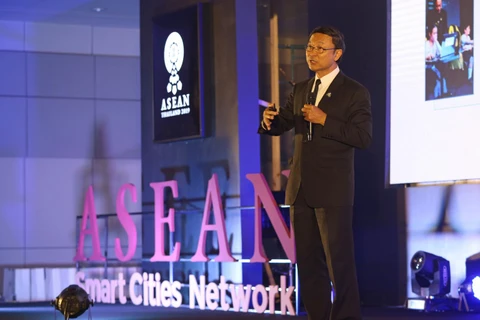Bangkok (VNA) – The Thai government is proceeding with the second phase of its smart city development project, covering 17 provinces across the country.
The provinces benefiting from the project include Chiang Rai, Phitsanulok, Nan, Ubon Ratchathani, Udon Thani, Nong Khai, Nakhon Phanom, Mukdahan, Krabi, Phangnga, Songkhla, Yala, Pattani, Narathiwat, Satun, Nakhon Si Thammarat and Ranong.
Two provinces in the northeast of Thailand, namely Roi Et and Nakhon Ratchasima, have submitted proposals to join the project.
Last year, the project was piloted in seven provinces - Phuket, Chiang Mai, Khon Kaen, Bangkok, Chon Buri, Rayong and Chachoengsao.
The government is gearing up to achieve its target of 30 smart cities in 24 provinces by 2019, and hopes to transform 100 cities nationwide to smart cities by 2022.
Transformation to a smart city may have close connection to smart economy, smart mobility, smart energy, smart living, smart people, smart governance and smart environment.
The approved cities will receive smart city symbols, and have investment preferences from the Thailand Board of Investment.
Building smart cities nationwide is a government priority, making existing cities smarter with modern design and smart technology. Besides, the Thai Government has approved the Ministry of Digital Economy and Society’s action plants to attract non-ASEAN countries to invest in infrastructure of smart cities in the ASEAN Smart Cities Network (ASCN).
The ASCN was an initiative from the 2018 ASEAN Summit in Singapore, with a mutual goal of creating sustainable smart cities, promoting quality of life in ASEAN via technology and innovation, and coping with urban expansion problems such as congestion, poor-quality water and air, poverty, increasing inequality, the quality gap between urban and rural areas, and security.
To become a smart city, these locations must revamp their infrastructure, data connections, technological systems and cultures.
The 26 cities are Bandar Seri Begawan, Banyuwangi, Battambang, Cebu, Da Nang, Davao, Jakarta, Hanoi, Ho Chi Minh City, Johor Bahru, Kota Kinabalu, Kuala Lumpur, Kuching, Luang Prabang, Makassar, Mandalay, Manila, Nay Pyi Taw, Phnom Penh, Siem Reap, Singapore, Vientiane, Yangon and three cities in Thailand: Bangkok, Chon Buri and Phuket.
The first conference of the smart cities will be held in Thailand in August, discussing and sharing experience in developing smart models.-VNA
VNA























